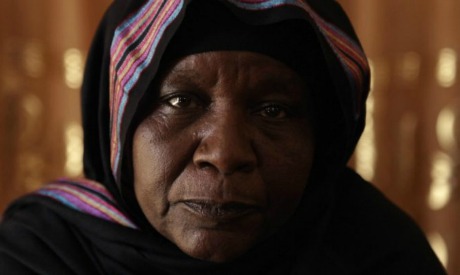
(Photo: Still from Mahamat-Saleh Haroun's documentary on Hissène Habré, France 24)
The former Chadian strongman is sometimes referred to as “Africa's Pinochet” due to the atrocities committed during his turbulent eight-year rule (1982-90). But unlike the late Chilean dictator, who died without ever going to trial, Habré is being prosecuted for crimes against humanity by a Senegalese court set up at the behest of the African Union – in a test case for African justice. The landmark proceedings, which opened amid riotous scenes in a Dakar tribunal last year, follow a 25-year campaign to bring him to court.
The extraordinary footage of the former rebel-turned-despot being forcibly carried into the courtroom, kicking and screaming, forms the closing scene of Mahamat-Saleh Haroun's documentary “Hissein Habre: A Chadian Tragedy”, which opens in Cannes' Special Screenings segment on Monday.
A past winner of the festival's jury prize for “A Screaming Man” (2010), Haroun has spearheaded the renaissance of Chadian cinema after decades of war. His new work will help raise awareness of his country's troubled past, a subject that remains little known outside French-speaking Africa.
'Broken both physically and mentally'
Haroun conveys his country's tragedy with visual and narrative economy, focusing his camera on Habré's traumatised victims. There is no archival footage or attempt to reconstruct the history of his regime and its crimes. Haroun's narrator provides just enough context to grasp the essential features of a brutal dictatorship supported by France and the US as a bulwark against Colonel Gaddafi's Libya.
This includes references to Washington's suspected role in funding, arming and training Habré's dreaded political police, which a Chadian truth and reconciliation commission has accused of murdering up to 40,000 people and torturing many more.
The horror is portrayed through the mangled bodies, parched eyes and broken voices of those who survived the ordeal. We hear of limbs crushed with hammers, skulls squeezed in between sticks tied by ropes, eyes sprayed with insecticide. One man says he counted 2,053 dead in Habré's jails and prayed for everyone of them.
Another confesses he once wished more would die to make room in his overcrowded cell. Corpses were used as pillows. “The worst bit is how banal death had become,” says Clément Abaïfouta, 58, describing himself as a “half-man, broken both physically and mentally”.
Abaïfouta spent four years in Habré's jails and has fought for justice ever since. Throughout the film, he serves as both a lucid guide and a patient listener, his soothing words contrasting with the horror described by fellow victims. His gentle touch (emphasised in a marvellous scene of him washing the frail body of an elderly man who may be his father) and steely determination give the film a heartening undertone. And there is beauty in Haroun's powerful close-ups of faces scarred by pain but thirsting for justice.
The root of evil
The film's Cannes premiere follows the screening on Friday of “Exile”, the latest work by Cambodian helmer Rithy Panh, who has spent a lifetime probing the hidden wounds of his country's genocide under the Khmer Rouge. Both Panh's and Haroun's works lay bare the everyday trials of societies that have been forced to draw a clean slate over a terrible past, in which the victims are deprived of justice and closure, living side by side with their tormentors of yesteryear.
“A Chadian Tragedy” exposes this shocking adjacency in a surreal confrontation between a man crippled by torture and his former jailor. “I was just a dog obeying orders,” says the latter, struggling to express believable regret. “I didn't think you would take it personally.”
While Haroun's documentary ends on a positive note with the start of Habré's trial, it does so without naiveté. The pain, and the evil that caused it, will not simply vanish if the “African Pinochet” is found guilty when a verdict is due later this year. “We can tell where the evil comes from,” says a doctor earlier in the film, upon looking at the results of an MRI scan carried out on a patient crippled by torture. Indeed science can explain why the patient is unable to stand upright after years of starvation in Habré's jails. But there is no answer to the filmmaker's underlying question: why did we inflict such evil upon ourselves?
*The spelling of Habré's first name in the title of the film is different from the one used by FRANCE 24.
For more arts and culture news and updates, follow Ahram Online Arts and Culture on Twitter at @AhramOnlineArts and on Facebook at Ahram Online: Arts & Culture
Short link: